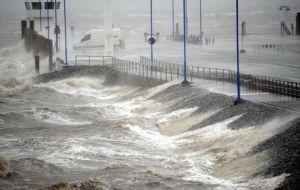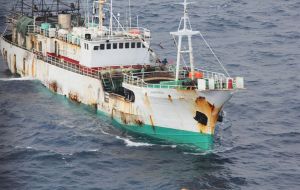MercoPress. South Atlantic News Agency
“Healthy oceans, healthy planet”, an essential component of the Earth's ecosystem
 “Oceans are an essential component of the Earth’s ecosystem, and healthy oceans are critical to sustaining a healthy planet,” said Ban Ki-moon
“Oceans are an essential component of the Earth’s ecosystem, and healthy oceans are critical to sustaining a healthy planet,” said Ban Ki-moon  Science is clear: humans have caused changes to the climate system that are linked to the warming of oceans, and sea-levels are rising
Science is clear: humans have caused changes to the climate system that are linked to the warming of oceans, and sea-levels are rising  This year’s theme spotlights the damage oceans sustain: overexploitation, illegal, unreported and unregulated fishing, as well as unsustainable aquaculture practices
This year’s theme spotlights the damage oceans sustain: overexploitation, illegal, unreported and unregulated fishing, as well as unsustainable aquaculture practices Although the world’s oceans are vast, their capacity to withstand damage caused by human activity is limited, compromising their critical contribution to the future of sustainable development, Secretary-General Ban Ki-moon declared on Monday as the United Nations kicked-off its celebrations for the 2015 edition of World Oceans Day.
“Oceans are an essential component of the Earth’s ecosystem, and healthy oceans are critical to sustaining a healthy planet,” the Secretary-General affirmed in his message for the Day.
“Given how critical oceans are to the health of our planet and the prosperity of people, they are an essential element in our emerging vision for sustainable development, including the new set of sustainable development goals now being prepared to guide the global fight against poverty for the next 15 years.”
Two out of every five people live relatively close to a shore and three out of seven depend on marine and coastal resources to survive, according to Mr. Ban, who added that the world’s oceans also help regulate the climate, process nutrients through natural cycles and provide a wide range of services, including natural resources, food and jobs that benefit billions of people.
The growing threat of climate change, however, has posed an increasing challenge to their health and productivity, particularly as oceans absorb a large portion of greenhouse gas emissions and are becoming more acidic as a result.
“Ocean ecosystems are degrading. Corals, which sustain so much of marine life, are vulnerable to bleaching and even death caused by warmer temperatures,” the UN chief affirmed. “The science is clear: humans have caused changes to the climate system that are linked to the warming of oceans. Sea-levels are rising, with devastating effects on vulnerable communities, especially people living in small island developing States.”
The UN General Assembly has recognized oceans and seas as an important part of sustainable development – as envisioned by the Millennium Declaration and its landmark anti-poverty goals (MDGs). Looking now to craft a successor post-2015 sustainable development agenda, Member States have identified protecting oceans as one of the keys to creating a better, cleaner future for the planet.
Since 2009, the UN family has come together each year, urging communities to ensure that our oceans remain clean and healthy. This year’s theme Healthy oceans, healthy planet spotlights the damage oceans sustain due to human pressures including overexploitation, illegal, unreported and unregulated fishing, destructive fishing, as well as unsustainable aquaculture practices, marine pollution, habitat destruction, alien species, and climate change.
As Member States prepare for a crucial year of landmark agreements on climate change and ending poverty, success, Mr. Ban explained, “will demand that they look at the essential role of world’s oceans.”
“World Oceans Day is a chance to strengthen our resolve to appreciate, protect and restore our oceans and their resources,” he concluded. “In this potentially pivotal year, we must commit to using the gifts of the oceans peacefully, equitably and sustainably for generations to come.”




Top Comments
Disclaimer & comment rulesCommenting for this story is now closed.
If you have a Facebook account, become a fan and comment on our Facebook Page!